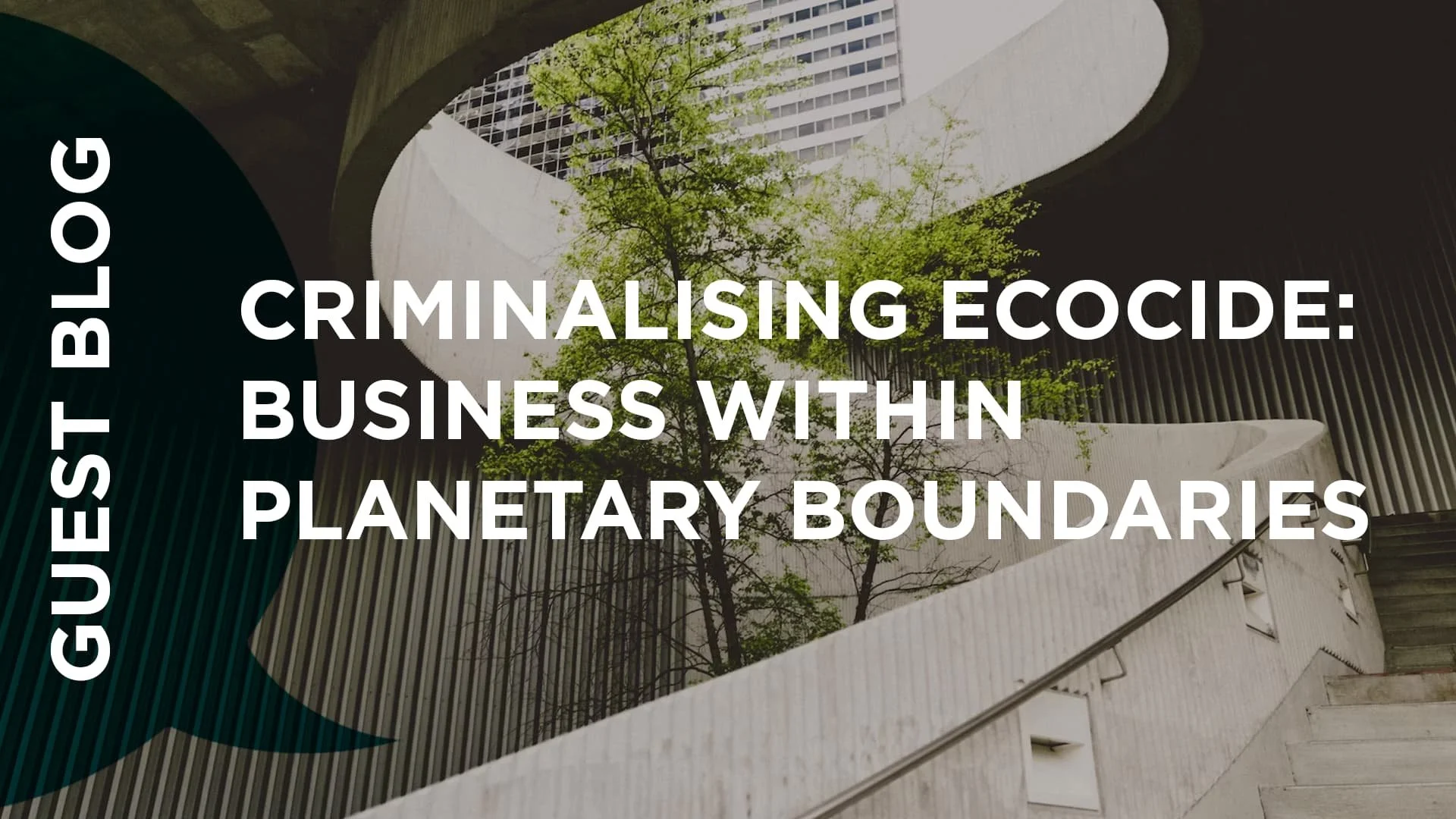Criminalising ecocide: business within planetary boundaries
This guest blog is part of a series intended as a dedicated space for the many global movements/campaigns around the globe confronting ecosystem destruction to share their stories, narratives and perspectives.
This guest blog was written by Sue Miller, Stop Ecocide International’s Head of Global Networks and originally published by the Confederation of British Industry (CBI).
Business within planetary boundaries: how a new ecocide law can help
Imagine a world where commerce and the Earth can both thrive; where environmentally responsible businesses are not undercut by those outsourcing their true costs to nature; where companies can invest in a stable and sustainable future.
That world could be closer than you think.
The Soil Association is a proud member of the Business for Ecocide Law network and a signatory of the Stop Ecocide International’s Business Open Letter
What is ecocide?
Ecocide – from the Greek “oikos” meaning home and the Latin “cadere”, to kill – is a word that is gaining currency and momentum as we collectively begin to comprehend the damage we are doing to the Earth. Ecocide happens because it is not adequately prevented by law.
The laws which govern commercial activity were created at a time when the Earth’s resources seemed infinite and the Earth itself invincible. However, they have not evolved in pace with our capacity to destroy and are no longer able to prevent the damage we are causing. Duty to shareholders still trumps duty to the planet. Investment and subsidies still flow towards activities which harm rather than heal. We are locked into a cycle of relentless extraction, mass production and thoughtless disposal without real consideration for the effect it is having on the Earth. Existing laws, pacts, treaties and agreements have proved ineffective against the worst practices. Any fines or civil damages awarded against polluting companies – if they are incurred at all - are treated as a business expense, dwarfed by the vast profits to be made.
Thought-leading tech company Ecosia has been an avid and long-time supporter of the global growing movement to criminalise ecocide.
If we are to protect the Earth from unthinking and reckless destruction, we need to change the rules.
In June 2021, an Independent Expert Panel of international lawyers (IEP), convened by the Stop Ecocide Foundation, published a definition of a new international crime of ecocide, designed to be added as an amendment to the founding document of the International Criminal Court (ICC). There, it would take its place alongside the crimes humanity considers to be the most egregious: genocide, crimes against humanity, war crimes and crimes of aggression. And, as we are beginning to see, the effects of severe environmental damage can be as harmful as genocide.
The definition is as follows:
“ecocide” means unlawful or wanton acts committed with knowledge that there is a substantial likelihood of severe and either widespread or long-term damage to the environment being caused by those acts.
It is designed to deter the worst acts of environmental harm by creating personal criminal liability for the key decision makers behind them, creating a line beyond which harmful commercial activity is deemed unacceptable and moving it into a safer, more sustainable place where all can thrive.
Ultimate goal - ecocide as international law
The ultimate objective is to enshrine ecocide law at the ICC where it will create an international, cross border safeguard. However, following publication of the IEP definition a number of countries have already decided to press ahead with their own national ecocide laws based upon it. Belgium, Netherlands, Spain, Italy, Mexico and Brazil all have ecocide bills going through their Parliaments at the moment. Chile, when it recently consolidated existing environmental laws within its constitution, incorporated elements of the IEP definition. And, as this piece is being written, a new environmental crime, based on the definition, is being considered by the European Union.
Investors want it too
It is not just governments who are seeing the need for ecocide law. Investors too are calling for it. The International Corporate Governance Network, an organisation whose members have $70 trn under management, has issued statements to both COP26 and COP27 calling for governments and standard setters to support the creation of a new international crime of ecocide.
“Businesses working to deliver a more sustainable economy would benefit in more ways than one if ecocide was recognised as a crime” - Hans Stegeman, Chief Economist, Triodos Bank
What ecocide means for business
For most businesses there is nothing to fear from ecocide law and much to gain. It is designed to penalise only those responsible for the most severe environmental harm and will not be retrospective. Businesses which are properly run and which carry out proper due diligence are very unlikely to be in the crosshairs.
What it will do is create a more level playing field and disincentivise harmful decision-making. It will ensure that businesses striving to operate sustainably will no longer be undermined by those which cut corners, and will give them more confidence in the integrity of their supply chains. Ecocide law will incentivise responsible practices and channel investment and talent into healthy innovation. And, on a personal level, it will help to protect our only home, our health, our future and that of those we love.
Ecocide law is a law for our time and it is on its way.
To find out more about ecocide law, visit the Stop Ecocide International website.
You can also sign our Business Open Letter calling for governments of the world to support the creation of an international crime of ecocide. If you think your business would benefit from a more in-depth briefing on ecocide law, email sue@stopecocide.earth.




